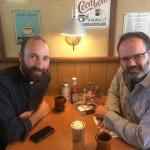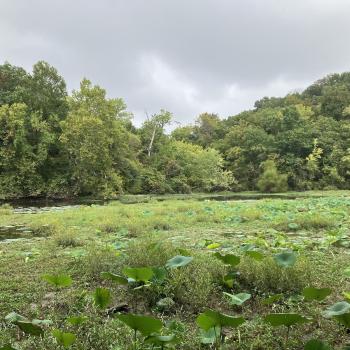i. Let’s Begin with a Paradox
A paradox is like a conundrum or something that can’t be explained. What I’m going to start with are two baffling verses in the same book.
1 John 3.9 (NRSV): Those who have been born of God do not sin, because God’s seed abides in them; they cannot sin, because they have been born of God.
1 John 1.8: If we say that we have no sin, we deceive ourselves, and the truth is not in us.
Do you see the paradox? He’s writing to the church in both chapters. What is the Apostle John saying? For the answer, you have to dig a little in the Greek.
Paradox of Sin in 1 John
In 1 John 3.9 sin is not a stand-alone word
It is a noun, but it’s linked to the verb “do . . . sin,” or “do not sin.” Not is placed in the middle of the verb. So it’s more about the verb in 1 John 3.9.
The verb to do is present, meaning that it happens now. It’s active, meaning that we’re engaging in it. It’s indicative, or a matter of fact. In other words, what John is saying is that people are trying to chase after sin now. This is something that John says should not be done.
In 1 John 1.8 sin is a noun and it does stand on its own
As a basic term in the Bible, sin can simply mean to miss the mark. It’s as if we draw back the arrow, we aim, we fire, and we’re missing what God has for us.
 Amy Spreitzer Windsor | Backyard Archery in Louisiana
Amy Spreitzer Windsor | Backyard Archery in Louisiana
2013 | Public Domain
Or it’s as if we’re running a race and we keep veering off to the side. We keep taking what we think are short cuts, but they end up being bunny trails.
We’re missing the mark. It means to err. It literally means to wander. One of our favorite sayings is, “Not all who wander are lost.” It’s commonly attributed to a character in The Lord of the Rings [actually misattributed]. But sin doesn’t mean to wander in a good way.
Sin is more of a noun. It means our occasional sins. There are times in our lives when we are going to miss it. We are going to wander from the truth and have to come back to the truth.
However, there are times in our lives when sin will become something we’re chasing after. That’s where the warning is.
ii. When someone is sinning, I ask these types of questions
Others who are spiritual pastors, directors, etc., may ask these same types of questions. Of course we ask people on the side. We don’t call them out in a church service.
Are you walking with God?
Are you turning toward God or are you shying away from Him?
I’m not talking about a one time occurrence. I’m talking about a habit or way of life.
Are you positioning yourself and turning toward Him, even if it hurts a little bit?
Walking in the light can be a little difficult sometimes because God can see us . . . like He can’t see us in the dark . . .
Are you on The Way or wandering from the path?
For those of us who have been in this game
For Christians who have a refined sense of discernment, we can discern with just a few questions like the ones above:
. . . if someone has sinned, and it’s hurt them or hurt their family
. . . or if someone is living in sin and chasing sin
We all sin, but if we’re not careful we can turn aside to a sinful lifestyle.
With gratitude to Pastor Peter Moon, of Harbor Light Christian Center in Traverse City, for sharing his pulpit with me on a fine Sunday morning, originally entitled The Dilemma of the Sin of Omission













